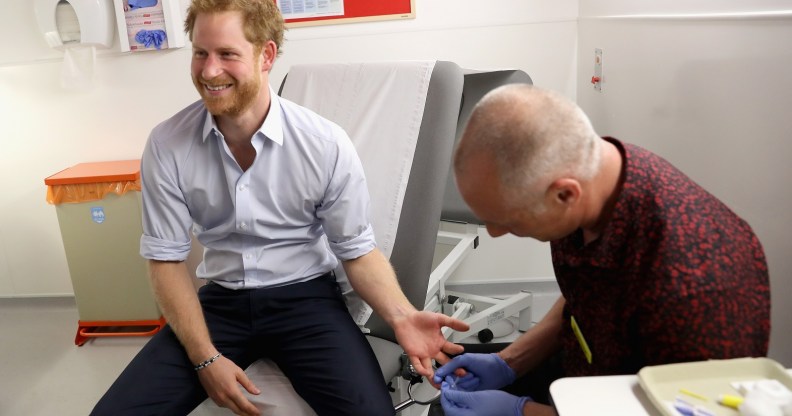‘Alarming’ rates of late-stage HIV diagnosis despite ‘Prince Harry effect’

Late-stage HIV diagnosis has reached “alarming” levels, with four in 10 patients’ immune systems irreparably damaged by the time the illness is detected.
Speaking ahead of National HIV Testing Week, Chief Executive of the Terrence Higgins Trust Ian Green has called for an imperative “culture shift” in attitudes towards HIV testing in a bid to “demystify” the virus and save lives.
Despite the availability and ease of HIV testing in the UK, the process still carries a social stigma which prevents many individuals from coming forward. When Prince Harry was HIV tested live on Facebook earlier this year, Terrence Higgins Trust saw a five-fold surge in demand for self-testing kits, but Green warns there are still huge strides to be made to prevent late diagnosis.

“The ‘Prince Harry effect’ showed us just now much work there is still to be done to tackle stigma around testing for HIV – as soon as one high profile individual lifted the lid on how easy it is to take an HIV test, people’s fear temporarily evaporated,” said Green.
Breaking down the fear surrounding HIV testing is key to protecting an individual’s health, as well as preventing them from unwittingly passing on the disease.
According to figures by Public Health England, straight men are most likely to be diagnosed in the later stages of the disease (55 per cent) followed by black African men and women (53 per cent) and straight women (49 per cent.)
Men who have sex with men are below average (30 per cent) when it comes to late diagnosis, but are still at high risk of the disease.

“The HIV epidemic hasn’t gone away; there are still alarming and unacceptable rates of late diagnoses, which perpetuate the spread of HIV in the UK,” said Green.
“We already have a powerful tool that could help stop the epidemic in its tracks: the HIV test. People who know their status can get onto effective treatment, which stops the virus from being passed on.
“But too many people are missing out on HIV tests – perhaps due to fear of the result, or the assumption that they’re not at risk.”
Free HIV testing is available in hospitals, sexual health clinics and community events. With self-testing kits it can even be done at home or by post.

Embarrassing Bodies’ Dr Christian Jessen, who has long been a of HIV testing, is also raising awreness ahead of National HIV Testing Week, which begins on Saturday.
“I often find that people are really afraid of taking an HIV test – it can sound like a daunting prospect, but honestly it isn’t. Testing puts you in control,” said Jessen.
“The challenge is now to bust the stigma that stops people getting tested in the first place. The sooner we can do that, the quicker we can stop HIV.”

